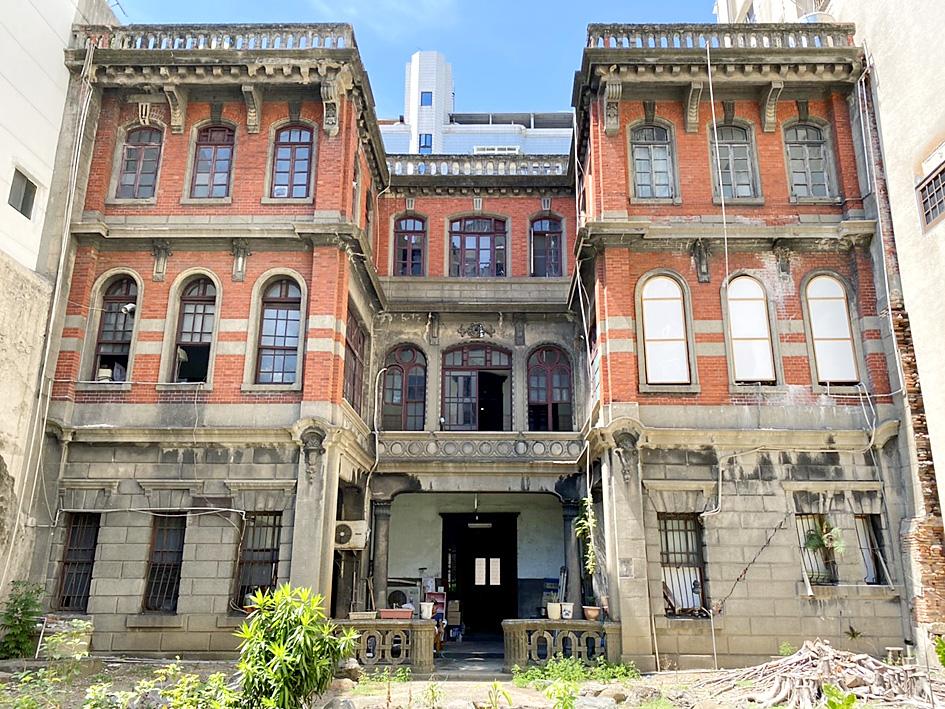The historic Chen Tien-lai Residence (陳天來故居) — the abandoned former home of a wealthy tea merchant — is finally to be restored by the Taipei City Government after years of property disputes, the city said yesterday.
The three-story mansion in Taipei’s Dadaocheng (大稻埕) area was the home of Chen and his family during the Japanese colonial era, but went unused in the decades that followed due to property disputes among surviving family members.
Concerned about the declining condition of the building, the Taipei Department of Cultural Affairs invoked Article 28 of the Cultural Heritage Preservation Act (文化資產保存法), which allows the city to take over a historic property if it is deteriorating due to the mismanagement of its owners, the city said.

Photo: Tang Hsin-hui, Taipei Times
The city’s plan to restore the building would cost NT$200 million (US$6.9 million), and work would start by October next year, with plans to finish by 2024, it said.
The budget includes NT$130 million to restore the building itself, NT$40 million to repair the surrounding property, and NT$30 million to restore historic artifacts in and around the building, it said.
The city would provide 80 percent of the funds, while the Chen family would provide the remaining 20 percent.
The building’s decorative columns, window frames and archways — made in a Victorian architectural style — would all need to be restored to their original appearance, professor and architect Hsu Yu-chien (徐裕健) said.
The city plans to open the space to the public once the restoration is completed, Hsu said.
“What the Chen Tien-lai Residence represents is not only Chen’s prosperity, but also the prosperity of Taipei and of Dadaocheng,” department Deputy Commissioner Tien Wei (田瑋) said.
The city has targeted 2024 as the completion date to mark the 100-year anniversary of the mansion’s construction, which ended in 1924, he said.
Speaking to reporters, Chen family members said that they had always wanted to restore the property, but disagreements on how to proceed had prevented any progress.
The family is grateful for the city’s involvement and hope the building could become a public center for cultural learning, they said.
“The Chen Tien-lai Residence is the most classic piece of architecture in all of Dadaocheng. The rock installation in its garden especially must be preserved,” cultural preservationist Mi Fu-kuo (米復國) said.
During restoration it would be a good idea to install a low perimeter wall around the property to lend it an air of “mysteriousness” and attract attention from passersby, cultural preservationist Chiu Ju-hua (丘如華) said.

Chinese Nationalist Party (KMT) Chairman Eric Chu (朱立倫), spokeswoman Yang Chih-yu (楊智伃) and Legislator Hsieh Lung-chieh (謝龍介) would be summoned by police for questioning for leading an illegal assembly on Thursday evening last week, Minister of the Interior Liu Shyh-fang (劉世芳) said today. The three KMT officials led an assembly outside the Taipei City Prosecutors’ Office, a restricted area where public assembly is not allowed, protesting the questioning of several KMT staff and searches of KMT headquarters and offices in a recall petition forgery case. Chu, Yang and Hsieh are all suspected of contravening the Assembly and Parade Act (集會遊行法) by holding

PRAISE: Japanese visitor Takashi Kubota said the Taiwanese temple architecture images showcased in the AI Art Gallery were the most impressive displays he saw Taiwan does not have an official pavilion at the World Expo in Osaka, Japan, because of its diplomatic predicament, but the government-backed Tech World pavilion is drawing interest with its unique recreations of works by Taiwanese artists. The pavilion features an artificial intelligence (AI)-based art gallery showcasing works of famous Taiwanese artists from the Japanese colonial period using innovative technologies. Among its main simulated displays are Eastern gouache paintings by Chen Chin (陳進), Lin Yu-shan (林玉山) and Kuo Hsueh-hu (郭雪湖), who were the three young Taiwanese painters selected for the East Asian Painting exhibition in 1927. Gouache is a water-based

Taiwan would welcome the return of Honduras as a diplomatic ally if its next president decides to make such a move, Minister of Foreign Affairs Lin Chia-lung (林佳龍) said yesterday. “Of course, we would welcome Honduras if they want to restore diplomatic ties with Taiwan after their elections,” Lin said at a meeting of the legislature’s Foreign Affairs and National Defense Committee, when asked to comment on statements made by two of the three Honduran presidential candidates during the presidential campaign in the Central American country. Taiwan is paying close attention to the region as a whole in the wake of a

OFF-TARGET: More than 30,000 participants were expected to take part in the Games next month, but only 6,550 foreign and 19,400 Taiwanese athletes have registered Taipei city councilors yesterday blasted the organizers of next month’s World Masters Games over sudden timetable and venue changes, which they said have caused thousands of participants to back out of the international sporting event, among other organizational issues. They also cited visa delays and political interference by China as reasons many foreign athletes are requesting refunds for the event, to be held from May 17 to 30. Jointly organized by the Taipei and New Taipei City governments, the games have been rocked by numerous controversies since preparations began in 2020. Taipei City Councilor Lin Yen-feng (林延鳳) said yesterday that new measures by